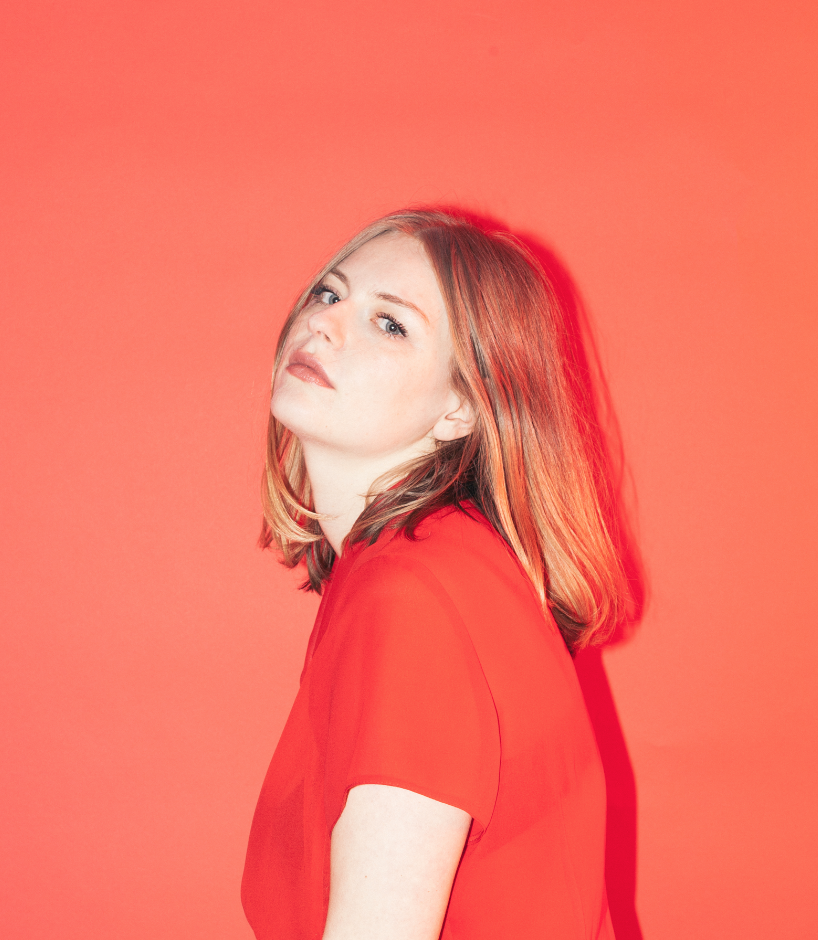Bubblin’ Up: Perel
The rising German talent reveals the story behind her upcoming album on DFA Records.

Bubblin’ Up: Perel
The rising German talent reveals the story behind her upcoming album on DFA Records.

A regular in the Berlin house scene, Annegret Fiedler (a.k.a Perel) is about to make her international break with a debut LP to be released on DFA later this year. A soft-hearted and spiritual force, the producer-vocalist is returning to her electro roots, with a sound forged through her East German identity, with lashings of wave and krautrock influences.
Born and raised behind the Iron Curtain in the DDR (the Deutsche Demokratische Republik), Fiedler grew up in an era where culture and music were restricted to whatever the system governed. Having spent her childhood listening to her parent’s krautrock and wave collection, Fiedler is now slowly growing in stature, setting her own terms of her success, and becoming the first German to release on DFA. With the EP Die Dimension having been released last year—and an album due in 2018—Fiedler will bring with her a sound that isn’t too distant from the records she grew up on, dictating to the world a musical narrative that took her from East Germany to New York, and back again. “It still feels like a dream to me, as DFA was one of the labels I grew up with,” she confesses. With these exciting releases on the horizon, Daniel Cole travelled to Berlin to learn more.
Far from bubbling under, Fiedler—having lived in Berlin since 2010—has had several house releases over the past seven years. As an artist, she is someone who survived the Berlin scene, seemingly coming out stronger and brimming with confidence about her new direction. “Since I realized what my purpose was with my music, I had trust in the universe,” she states about her new found success.
I first find out about Perel’s forthcoming release on DFA when we meet up at a secret LCD Soundsystem gig at Berlin’s Funkhaus. With striking blond hair and tattooed wrists, Perel can come across as a steely Marlene Dietrich, if she had fronted an ’80s new-romantics era pop act while listening to hip-house records in her spare time. Later that night after the show, she managed to catch up with James Murphy, who tells her how much he’s looking forward to putting the record out. Somewhat overwhelming, it’s a huge step in the German producer’s career, one she’s managing with temperament and prudence, as she tells me in our candid conversation when we catch up a few weeks later. “I take care that I don’t say too much,” she says about her approach to interviews. “I’m cautious of what people will think about me.”
Behind the decks, the German producer is a bouncy, and infectious performer, one that is very giving to a dancefloor’s needs. Having caught one of her sets recently at Leipzig’s cult-spot Institut fuer Zukunft, it was interesting to see how young and engaged the crowd was, asking for track names, and getting into the flow. It was a mixture of modern house numbers, edits, and ’80s electronic (or at least ’80s electronic sounding jams, like Francisco’s “Beat Line,” and the contemporary disco take that is Marvin & Guy’s “Theme from Fire! Fire!” on Permanent Vacation). This intersection of old and new perfectly sums up Perel’s style. It’s also a style that is gaining recognition throughout Europe, having recently just played alongside DJ Harvey, and Carlos Souffront at Paris’ Concrete.

Originally from Saxony, tucked away in the south-eastern corner of Germany, Annegret “Perel” Fiedler grew up in quintessential, East German surroundings. She reminisces about her parents’ record collection—of which she confesses to having taken most of for herself—featuring ’80s krautrock, and classic East German music, including that of Reinhard Lakomy, a much beloved, children’s music writer. “Subconsciously, you take a lot of influence from your upbringing,” she states. “That’s why I decided to sing in German—something that is actually quite difficult.” Her East German connection goes far beyond her vocals. Just scanning through her Facebook page, and her forthcoming gigs are advertised using cutouts from old ’80s, German teenage magazines of kids with slick haircuts, and loose-fitting trousers, characterizing the former nightlife scene. It comes across initially as cliquey, but behind the lighthearted imagery is an artist connecting her modern-day self with her childhood roots.
Moving to the city of Halle to study around the turn of the century, Fiedler entered a new world that opened up her musical opportunities. “At that time in Halle—like other cities such as Berlin when the wall came down—was full of empty houses and so much space. You would have illegal parties everywhere,” she states. “You’d have all these art students and it was really cool.” Already making music and DJing, Fiedler started to front a chic, electro-pop act called Thiz iz a Dead Parrot—a band in sync with the late electro-clash rumblings of the time. With black hair and a deadpan demeanour, Thiz iz a Dead Parrot fully advocated the synth and krautrock influences that constituted Perel’s East-German upbringing. Ultimately a lot of fun, it began her career as a frontwoman, setting her up to be her own vocalist.
Looking to further her career, Perel moved to Berlin in 2010. DJing under the name Annek, she was playing a selection of rock n’roll, electro, and a lot of ’80s wave music. “My first DJ gigs in Berlin were at indie clubs, like Magnet,” she describes. “I was more into this indie-thing but then I slowly discovered the club scene.” With its infinite possibilities and 24-hour party culture, Berlin sucked her in hard, acting as a surrogate musical playground for Perel’s talents, “It was a huge feeling of freedom just discovering every kind of club. Cookies on Tuesday, Horst, Stadtbad—stuff like that.”
As Annek, she went on team up with local DJ Mathias Meyer to form Klub.Mono, a hybrid, live-DJ act, that brought together the worlds of electro, pop, and house. It was stylish, brash, and full of energy that earned the duo a residency at the city’s Wilde Renate club. “I always loved that ’80s stuff, the transition from disco to house,” she says about her style. In 2013, Fiedler took on the name Perel (taken from the Greek and Afrikaans meaning of her name) to make a break and distinction between the black haired, indie-wave kid of before, and to define the new, house-loving DJ in Berlin. “I loved listening to really straight house music,” she says about the period. “It was almost-something new to me.”
As Perel, she became an authentic selector and dominant act behind the decks. Gaining authenticity in Berlin is one of nightlife’s major credits, which is something she achieved. “My first [Perel] record came out in 2014, and it was a hip-house number.” Featuring MC Abba Lang and released on the German label O*RS, Body Talk was a single that categorized the jaunty, and earnestness about Perel’s sound. It was, to a certain degree, very much the sound of Wilde Renate.
Following this came records on Do Not Sleep (the classic-house sounding “Charles Manson“), various remixes, and a whole sleuth of touring, but she soon grew disillusioned with her career with house music, and started to question whether it was the right direction. “It didn’t feel comfortable to me. It wasn’t the right scene and it turned into something strange,” she confesses. “I didn’t know what kind of music I wanted to do. I loved house music, but I felt for some reason making music this way didn’t feel right.”
“I wasn’t even playing my own records when I was DJing and wasn’t happy with my career. I needed to get back to doing melodies.”
Highly integrated into the Berlin club scene, the pressure to remain and keep face was high. “I had just finished my studies and I cancelled all my job offers and focussed all my energy on making music.” Wanting to succeed and work as a full-time musician, she became conflicted with who she was and where she was going. “I wasn’t even playing my own records when I was DJing and wasn’t happy with my career. I needed to get back to doing melodies,” she states.
Ultimately, the strict nature of house music was not representative of her character, and a change was inevitable. “I always thought I needed to be a cool girl to survive the world of male DJs. I thought I had to do really rough house music. But this is bullshit because that’s not me. I stressed myself out a lot. It was stupid to focus on music without a job. Hustling without knowing what’s coming next.” Fiedler reflects upon this period with great candour, acknowledging that it was both necessary and hard, leading to something transformative. “I felt a lot of energy for something new. I had to ask myself why am I doing music. To be famous? No. In the end, I realised it was all about melodies.”
And then something did change, with bountiful melodies. In 2016, Amin was released on Mile End Records. Progressive and full of melody, pads, and strings, with a late-Innervisions charm, the record had less of a beat and far more flare. “It was like a new beginning,” she said about the record. “It was about switching off your brain and doing the music you really feel.” Among many other things, the record came about as a process of changing her approach to production; recording live, using an old Novation synth, taking her time and allowing mistakes to happen. The natural ebb and flow came through and the record’s harmonious sound happened naturally. From being in an insecure place to being at a point of confidence about the sounds she wanted to make, and the way she wanted to make them, Fiedler began to find her sound.
A spiritual person at heart, Fiedler believes that everything in her life is related. To her, it was no coincidence that with the release of Amin, the next steps in her musical journey started to fall into place. And as the universe began to speak, so did Tim Sweeney. A fan of the record, he invited Perel to play on Beats in Space while she was in New York over the Christmas period. Afterwards, while playing with Justin Strauss at The Lot Radio, Juan McClean swung by and liked what he was listening to—which happened to be unreleased Perel records. He asked her to send the music over, and in turn forwarded it to Jonathan Galkin at DFA Records. “I sent them all my tracks, and they suggested doing the album. I thought they were kidding me,” she describes. Having received a folder of unpublished, and largely unfinished works, Galkin listened through everything and decided what was going to constitute the record.
“Die Dimension” is the first song to be released from the LP. It’s a record that has the nu-disco vibe of early Lindstrom with a cold steely demeanour, the cool synth sounds of Saint Etienne, and the driving energy of Neu! “I love daring to have big melodies, and you can hear it on the single,” she declares. There’s also something epic about German vocals; a mysterious, dramatic poetry that befits the un-wavering, electronic tapestry. “I had to send DFA an explanation of what the song was about,” she says about the track. “It’s ultimately about the feeling that we’re all caught in a world where we’re just slaves—our world situation, trying to get rid of these social patterns, and false role models.” The song serves as a reflection of her insecurity, and search for identity in modern times—portraying her story from being an actor in the German house scene to looking for her real artistic self.

From her beginnings in an electro-band, through to surviving the Berlin house scene, Perel’s musical journey is one about reconnecting with herself and her environment—one that is open to vulnerability. “Berlin did something to me because I was partying hard the first four years and it was too much,” she confesses.” At the same time, her Berlin experience became a transformation. “It was a self-discovery, about who you are and what do you want to do with your music. Everything has a natural flow, from when I met Tim Sweeney, to my housemate and I spending Christmas in New York,” she states. “I started to pray to the universe, and become very grateful for everything that happens. I have contact with a spiritual dimension and it changed me in my heart, to see good in people and to get rid of negative energy.”
Having bridged the gap between her East German upbringing, and contemporary sounds as Perel, the future is still very much open. “I’m honest enough to say that I have contact with a spiritual dimension, and it changed me, in that I followed my heart,” she confesses. Connecting dimensions, Perel’s honest, heartfelt and melodic krautrock depicts a story about breaking down facades, being honest and going all the way. Currently working on her live show, in which she once again becomes the lead singer of her own band, Perel has come full circle and is one to watch whether it’s in this year, or the next.

